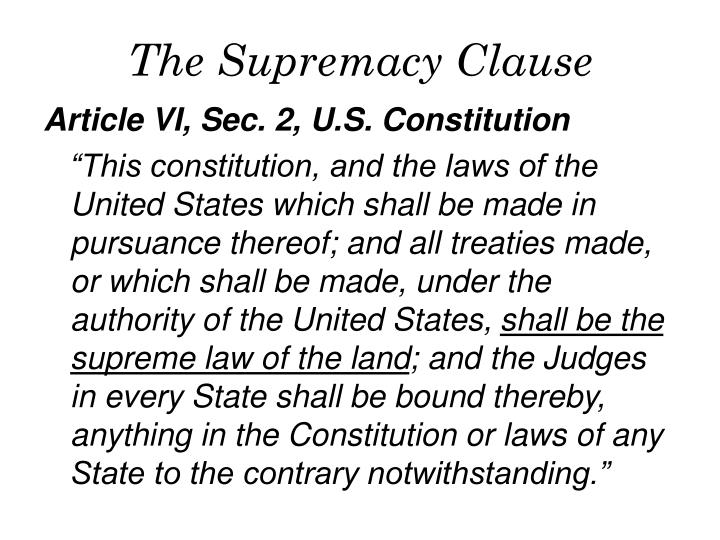
Absolute Federal Supremacy: The Myth That Just Won’t Go Away
By: Mike Maharrey
It never goes away – the myth of absolute federal supremacy.
I got an email from a Tenth Amendment Center volunteer in Illinois last week. He has been working to get the Fourth Amendment Protection Act introduced there. Passage of the bill would end state cooperation with unconstitutional federal warrantless surveillance. But he’s run into a bit of a snag. The senior attorney for the Senate Democrats told him that “all federal laws supersede state laws.”
Now, of course, the federal government is supreme. The Supremacy Clause in the Constitution makes this clear. But this notion that supremacy means the federal government can do anything it wants any time it wants is simply absurd.
Fact: The federal government is only supreme within its sphere.
Think about a referee in a football game. He is the supreme authority on the football field. But that supremacy doesn’t mean he can go to a baseball game and start calling balls and strikes. The baseball game lies outside of his sphere. He has no authority there.
The Supremacy Clause declares that the Constitution and all laws … “in pursuance thereof” are the supreme law of the land. Any actions that are not “in pursuance thereof” lie outside of the sphere of the federal government. They are not supreme. In fact, Alexander Hamilton called such laws “void.”
Hamilton laid out the scope of the federal government’s supremacy in Federalist #33.
“If a number of political societies enter into a larger political society, the laws which the latter may enact, pursuant to the powers intrusted to it by its constitution, must necessarily be supreme over those societies and the individuals of whom they are composed….But it will not follow from this doctrine that acts of the large society which are not pursuant to its constitutional powers, but which are invasions of the residuary authorities of the smaller societies, will become the supreme law of the land. These will be merely acts of usurpation, and will deserve to be treated as such. Hence we perceive that the clause which declares the supremacy of the laws of the Union, like the one we have just before considered, only declares a truth, which flows immediately and necessarily from the institution of a federal government. It will not, I presume, have escaped observation, that it expressly confines this supremacy to laws made pursuant to the Constitution.”
The Constitution limits federal supremacy to those objects falling within the general government’s delegated powers and not one iota beyond them.
St. George Tucker wrote the first extended, systematic commentary of on the Constitution shortly after ratification. For nearly half a century, it was one of the primary sources for law students, lawyers, judges and statesmen. His commentary echos Hamilton’s explanation in the Federalist.
It may seem extraordinary, that a people jealous of their liberty, and not insensible of the allurement of power, should have entrusted the federal government with such extensive authority as this article conveys: controlling not only the acts of their ordinary legislatures, but their very constitutions, also.
The most satisfactory answer seems to be, that the powers entrusted to the federal government being all positive, enumerated, defined, and limited to particular objects; and those objects such as relate more immediately to the intercourse with foreign nations, or the relation in respect to war or peace, in which we may stand with them; there can, in these respects, be little room for collision, or interference between ‘the states, whose jurisdiction may be regarded as confided to their own domestic concerns, and the United States, who have no right to interfere, or exercise a power in any case not delegated to them, or absolutely necessary to the execution of some delegated power.’
That, as this control cannot possibly extend beyond those objects to which the federal government is competent, under the constitution, and under the declaration contained in the twelfth article (Tenth Amendment), so neither ought the laws, or even the constitution of any state to impede the operation of the federal government in any case within the limits of its constitutional powers. That a law limited to such objects as may be authorized by the constitution, would, under the true construction of this clause, be the supreme law of the land; but a law not limited to those objects, or not made pursuant to the constitution, would not be the supreme law of the land, but an act of usurpation, and consequently void. [Emphasis added]
In a nutshell, the federal government does exercise supremacy, but only within its limited sphere. It is not an anything and everything proposition.